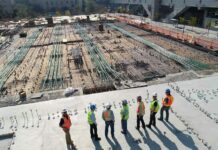Technology happens to be an essential tool for HVAC contractors, offering a range of benefits. Cloud-based software automates processes and also improves service schedules; on the other hand, mobile devices provide real-time updates and documentation. Additionally, AI enables predictive maintenance, thereby further elevating the efficiency of HVAC operations.
With the rising reliance on technology so as to manage HVAC systems, what technological trends can HVAC professionals look out for in the upcoming year?
Connectivity and predictive maintenance
The integration of Internet of Things- IoT connectivity and smart devices such as smart thermostats, smart meters, and also sensors, is happening at an extraordinary pace in terms of both commercial and residential construction. This trend is justified because of numerous compelling reasons. IoT devices help with seamless connectivity, thereby enabling HVAC systems to remotely control and also monitor all connected building systems by way of a unified interface. Building automation systems have the capacity to adjust heating, air conditioning, and also smart blinds at different levels throughout a building. This enables for the accommodation of transforming external conditions like fluctuating temperatures and also direct sunlight.
These systems not just go on to produce real-time data in terms of temperature, humidity, and airflow, but they also have in them to recognize energy consumption patterns and also potential problems before they come in picture. Technicians can make use of networks of interlinked sensors, data analytics, and also machine learning algorithms to keep analyzing HVAC systems. This enables them to track various aspects like airflow imbalances, clogged filters, and also equipment failures. Because of this, they can effectively plan proactive maintenance, which helps them look into system malfunctions before they even take place. This approach helps in minimizing downtime, elevating system performance, and, at the same time, preventing the need for repairs that are costly.
Green systems
Eco-friendly systems. Energy-efficient. Green initiatives.
Despite of what one chooses to call them, there is a major demand for them. As energy costs rise further, consumers are consistently seeking ways to save money. Thereby, demand for cost-saving measures is all set to further increase in 2024.
The growing adoption of renewable sources of energy goes on to involve the installation of solar panels on residential as well as commercial buildings. But there is also a growing demand for high-efficiency HVAC systems, which include variable refrigerant flow- VRF systems, geothermal heat pumps, and dual-source heat pumps. This demand is in part driven by the renewal of the HVAC technology tax credit by Congress.
Geothermal heat pumps extensively rely on ground and water sources so as to provide heating, cooling, and, when equipped, even hot water supply. Certain models happen to be equipped with two-speed compressors as well as variable fans that happen to provide extra comfort and also help save energy. When compared to air-source heat pumps, ground-source heat pumps offer numerous benefits in terms of their quiet operation, broadened lifespan, low maintenance needs, and independence from outside temperature alterations. Dual-source heat pumps blend the advantages of both air-source as well as geothermal systems. Although they are not as effective as geothermal units, they are mostly more affordable to install and, at the same time, perform almost as effectively.
HVAC technicians happen to be receiving an increasing number of needs for environmentally friendly cooling solutions. Green cooling techniques use of natural refrigerants such as carbon dioxide, ammonia, water, air, as well as hydrocarbons- HCs, which have a zero-depletion potential. This is in complete contrast to traditional refrigerants, which happen to result in both direct along with indirect emissions. These natural refrigerants are mixed with energy-efficient appliances in order to achieve environmentally friendly cooling. These refrigerants are easy on the pocket and do not create long-lasting waste since they are naturally an element of biogeochemical cycles.
Ductless solutions
Upgrading older buildings with air conditioning can be a world of an issue and costly endeavor, specifically when there is no existing ductwork that is in place. Even though ducts already have an element of the building infrastructure, they happen to be an imperfect system that often has holes as well as gaps, thereby resulting in air leaks.
To address such situations, HVAC technicians regularly rely on ductless technology. Ductless mini-split heat pumps happen to be a great choice for retrofitting structures that have non-ducted heating systems. They happen to be small in size and offer the flexibility to heat as well as cool specific areas as needed. They are also a suitable choice when it comes to areas or additions where it is not possible to extend or install distribution ductwork. Ductless systems happen to be known for their ease of installation as compared to other types of space conditioning systems. Moreover, since they do not have ducts, they do not suffer from the energy losses that are especially associated with standard ductwork.
The customer experience
The reason for success for HVAC contractors in 2024 and beyond lies in the broader consumer demand for eco-friendly solutions and also a far better understanding of the available HVAC technology. Companies must do more than just offer quality work at competitive prices. Today, customers happen to have high expectations for a smooth and uninterrupted experience. They desire immediate service, consistent attention to their HVAC needs, and the utilization of innovative as well as sustainable technology to effectively resolve any issues that may come up.
For HVAC companies, this means that there is more need to train technicians so they stay updated on the latest technological advances, and this also implies a greater reliance on technology tools, both for marketing their businesses to tech-savvy consumers as well as for enhancing the efficiency of technicians working in the field.
In today’s digital age, HVAC companies must take into cognizance the importance of having a strong online presence. With the rise of online testimonials, social media platforms, informative websites, and convenient features such as online appointment scheduling, consumers heavily rely on these resources when opting for service providers. Hence, it is indeed crucial for HVAC companies to invest in a vibrant online presence, which can effectively raise awareness and also generate interest in their business and services.
Many HVAC contractors are now making use of electronic communications so as to efficiently send messages to customers, plan appointments, deliver invoices, and also get payments. Field service management software, such as ServiceTrade’s HVAC software, helps the HVAC firms create calendars that can efficiently assign teams to different jobs, making sure that service hours are utilised well. Additionally, this software tracks costs, thereby offering valuable insights into job profitability. Drones are becoming more popular for inspecting infrastructure as well as delivering essential parts to technicians who happen to be in the field already.
In conclusion, the HVAC profession happens to be undergoing rapid changes, initially due to advancements in technology that are anticipated to have an even more significant impact in the years to come. HVAC contractors who are willing to take these advancements into account will discover greater opportunities to achieve their customers’ requirements and ultimately get more success in a highly competitive sector.




























